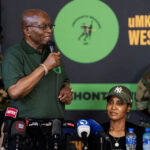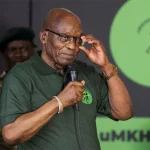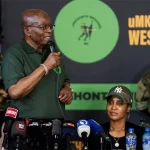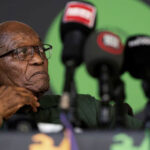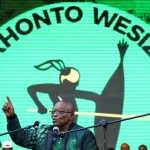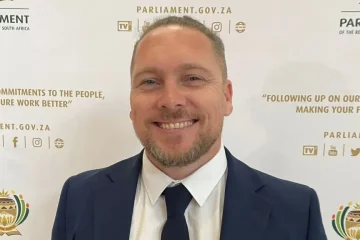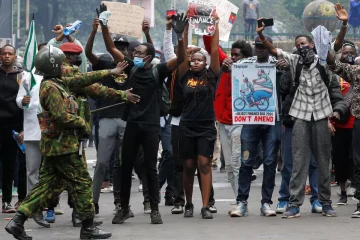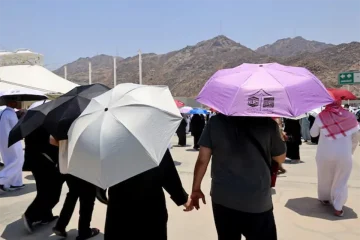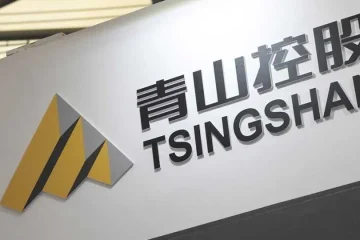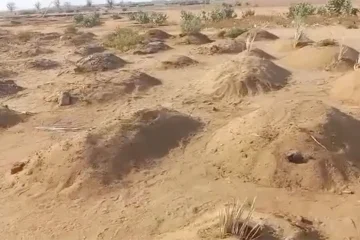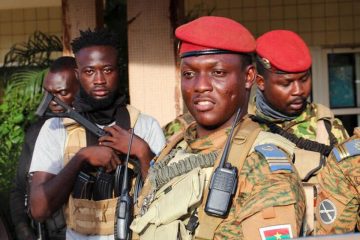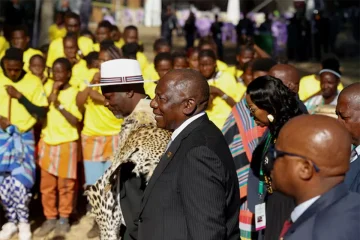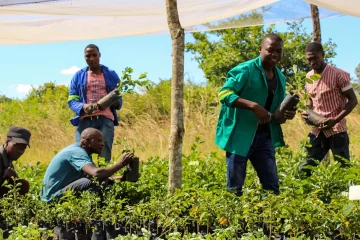SOUTH Africa’s KwaZulu-Natal provincial legislature elected an Inkatha Freedom Party member as its premier, picking him over the candidate put forward by the uMkhonto we Sizwe party led by former President Jacob Zuma.
Thami Ntuli’s election effectively shut out MK from governing the province, even though it was the party that got the largest share of the local vote in a May 29 election, while falling short of a majority.
“It’s an important journey that we’re starting today, joining the few from those who have gone before us to try and make the life of KwaZulu-Natal better,” Ntuli told provincial lawmakers after his election. “We’ll be hitting the road running as from today.”
An MK party spokesperson did not immediately respond to a request for comment. The party said in a statement that Zuma would speak on Sunday.
Ntuli got 41 votes, with the support of other parties, against 39 votes for the MK candidate to run the province, an MK stronghold.
No party had won an outright majority in the 80-member provincial legislature, forcing political forces to forge alliances to govern the province.
MK got 45.4% of the local vote, trouncing the IFP, which got 18.1%, and the African National Congress which came third with 17.0%. KwaZulu-Natal is the province where the economically important ports of Durban and Richard’s Bay are located.
The IFP, ANC, the Democratic Alliance and the National Freedom Party – with 41 seats in total – agreed to work together in the province, giving them a slim majority over MK and the Economic Freedom Fighters’ combined provincial seats.
“The DA is confident that this team will be able to navigate the difficult path ahead for the province, and call on all political parties to respect today’s outcome,” DA provincial chairperson for KwaZulu-Natal Dean Macpherson told Reuters.
Political analysts said such an anti-MK alliance could cause serious trouble in KwaZulu-Natal, where Zuma supporters rioted and hundreds of people were killed in violence in 2021 following news that he had been jailed for refusing to give evidence at a public inquiry into corruption during his time as president.
After coming to power in 2009, Zuma was forced to quit in 2018 following a string of scandals. The ex-president, who has always denied any wrongdoing, has since fallen out with the ANC.
Zuma’s MK, which came a surprisingly strong third in the national election, winning 14.6% of the vote which translated into 58 seats in the 400-seat National Assembly, is also not part of the national unity government championed by the ANC.
South Africa’s ANC brings opposition into government, a first in 30 years
WENDELL ROELF and NELLIE PEYTON
The African National Congress and its largest rival, the white-led, pro-business Democratic Alliance, agreed on Friday to work together in South Africa’s new government of national unity, a step change after 30 years of ANC rule.
Once unthinkable, the deal between two sharply antagonistic parties is the most momentous political shift in South Africa since Nelson Mandela led the ANC to victory in the 1994 election that marked the end of apartheid.
“Today, South Africa is a better country than it was yesterday. For the first time since 1994, we’ve embarked on a peaceful and democratic transfer of power to a new government that will be different from the previous one,” DA leader John Steenhuisen said in a televised address.
“From today, the DA will co-govern the Republic of South Africa in a spirit of unity and collaboration,” he said, adding that multi-party government was the “new normal”.
The ANC lost its majority for the first time in an election on May 29 and spent two weeks in talks with other parties that went down to the wire on Friday morning as the new parliament was convening.
“Today is a remarkable step in the aftermath of the 29th of May,” ANC Secretary-General Fikile Mbalula told reporters, adding that parties included in the unity government would be cooperating in both the executive and the legislative branches.
“Let me explain that the government of national unity is for the good of the country.”
Long seen as unbeatable in national elections, the ANC lost support in recent years as voters wearied of persistently high levels of poverty, inequality and crime, rolling power cuts and corruption in party ranks.
WATERSHED MOMENT
The DA’s entry into national government is a watershed moment for a country still processing the legacy of the racist colonial and apartheid regimes.
The party wants to scrap some of the ANC’s Black empowerment programmes, saying they have not worked and have mostly benefited a politically connected elite. It says good governance and a strong economy would benefit all South Africans.
The DA rejects accusations from opponents such as the hard-left Economic Freedom Fighters that it represents the interests of the privileged white minority – but it has struggled to shake off that image in the minds of some voters.
Others take a more positive view of the racial dynamics.

South African President Cyril Ramaphosa and Pemmy Majodina of the African National Congress (ANC) attend a swearing-in ceremony into the National Assembly during the first sitting of the National Assembly following elections, at the Cape Town International Convention Center (CTICC) in Cape Town, South Africa June 14, 2024. REUTERS/Nic Bothma
“The ANC was also failing. They need a partner so they can rise again. DA is mostly white people so if they came together we can have more power and maybe a lot can change, even jobs could be created,” said Bongani Msibi, 38, a street vendor in Soweto.
Helen Zille, a senior DA figure for and former leader of the party herself, said Steenhuisen’s skin colour was irrelevant.
“The melanin-quotient of the DA leader is the least significant aspect of this historic agreement,” she said in a post on X critical of some media headlines.
The EFF, which came fourth in the election, said it would have been prepared to partner with the ANC but not with the DA, which it has described as “a tool for imperialism and for white monopoly capital”.
INVESTORS WELCOME DEAL
Two smaller parties, the socially conservative Inkatha Freedom Party and the right-wing Patriotic Alliance, will also take part in the unity government, they said.
Meeting in Cape Town, the new National Assembly elected the ANC’s Thoko Didiza as its speaker. It was then due to elect its deputy speaker and the head of state.
President Cyril Ramaphosa, the 71-year-old ANC leader, is expected to win a new term with support from the other parties in the unity government pact.
A DA source said the party would receive the post of deputy speaker of the National Assembly under the deal.
The ANC won 159 of 400 seats in the National Assembly, while the DA got 87. The populist uMkhonto we Sizwe (MK) party led by former President Jacob Zuma has 58, the hard-left Economic Freedom Fighters 39 and the Inkatha Freedom Party 17.
The inclusion of the IFP, with its ethnic Zulu base, may help sweeten the DA pill for ANC voters. The Patriotic Alliance draws its support from the coloured (mixed-race) community.
A statement of intent of the government of national unity was circulated to party negotiators by the ANC’s Mbalula.
Among the “basic minimum programme of priorities” outlined in the document, seen by Reuters, were rapid, inclusive and sustainable economic growth, the promotion of fixed capital investment, job creation, land reform, infrastructure development, structural reforms and fiscal sustainability.
London-based research firm Capital Economics said the prospect of a coalition involving the ANC and DA was being well-received by investors because there was expected to be policy continuity or an acceleration of reforms, and because the EFF and MK would be excluded from policymaking.
Zuma’s MK came third in the election but alleged it was robbed of victory by vote-rigging and is boycotting the new parliament. On Friday, an IFP official was elected as premier of the KwaZulu-Natal province, Zuma’s stronghold, with the support of the DA, ANC and one other party, beating the MK candidate.
Political analysts said shutting the MK out of the province’s government, even though it had won the larger number of votes with 45%, could cause serious trouble in KwaZulu-Natal, where hundreds were killed in violence in 2021.







